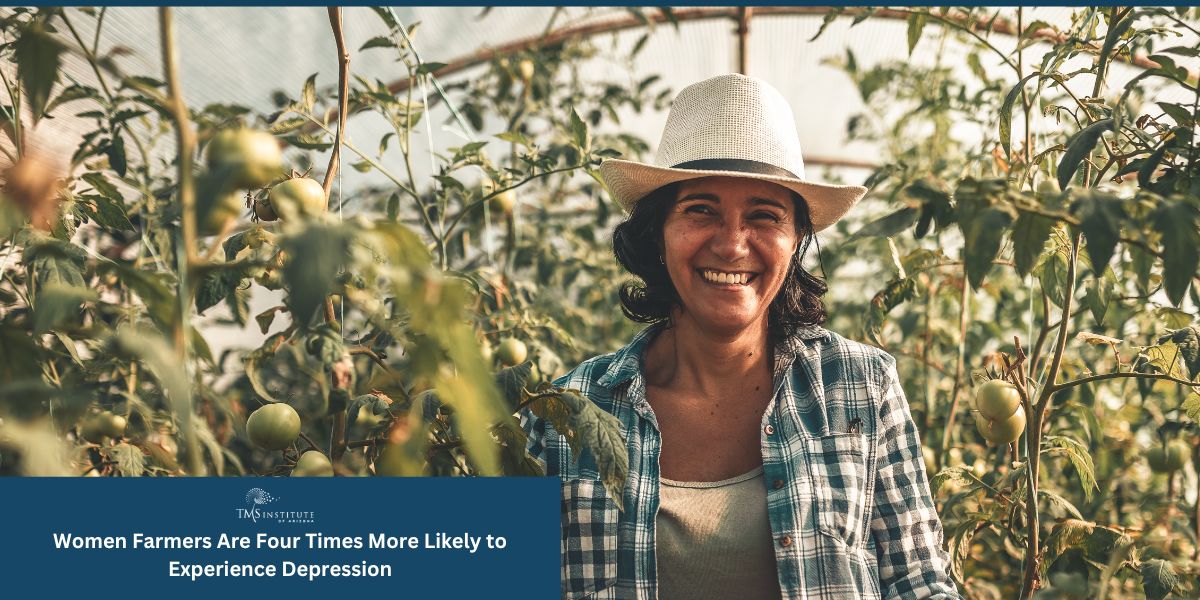
Farming is far from idyllic for many women farmers. Geographic isolation increases their risk of depression fourfold compared to men. Long hours and relentless financial pressures compound daily challenges. Social isolation adds another heavy burden. For these women, it’s not just a job. It’s a constant fight for mental well-being.
What Did the Study Reveal About Women Farmers and Depression?
New research emphasizes mental health struggles facing women in agriculture. Women farmers in Illinois are at higher risk of depression. Isolation and limited support add to their stress. Unique farming pressures make these risks even greater. Solutions are needed to support their well-being.
Elevated Mental Health Challenges in Agriculture
- Mental Health Prevalence: The study reveals that mental health issues are more prevalent among farmers than in the general population. Specifically, 33.9% of the surveyed farmers met the criteria for mild anxiety. And 26.3% met the criteria for mild depression.
- Comparison with General Population: Nearly 19% of U.S. adults deal with anxiety each year. Depression affects 18% of the population. Farmers face even higher rates. A serious public health issue. These statistics reveal a pressing concern for the agricultural community.
Gender Trends in Anxiety and Depression
- Equal but Different: Men and women farmers reported similar rates of anxiety and depression. However, gender-specific differences emerged. Men more often experienced mild anxiety. Women were more prone to moderate to severe depression.
- Pandemic Impact: COVID-19 brought heightened mental health challenges, especially among women farmers. Many reported increased rates of probable depression during this time. External crises had a compounding effect on their mental well-being. Farming communities felt the weight of this burden deeply.
Geographic Isolation: A Key Stressor for Women
- Isolation as a Unique Challenge: Geographic isolation poses a greater stress burden on women farmers compared to men. Women facing extreme isolation experience a significantly higher risk of depressive symptoms. Their odds are four times greater than men dealing with similar conditions. Reported odds ratio (OR) is 4.46.
- Social Disconnection: Isolation goes beyond physical distance. Limited social interactions and support systems impact mental well-being. Women in agriculture often face geographic isolation, reducing their connections. This amplifies loneliness. Hopelessness may deepen as a result.
Economic and Environmental Stress: Gendered Experiences
- Economic Pressures Differ by Gender: Men faced higher stress levels linked to economic and environmental conditions. Women involved in niche or part-time farming encountered financial stress in a unique way. Niche farming sometimes provided a buffer against severe financial pressure. However, financial stress remained a persistent issue for many women. Economic burdens touched every aspect of their lives, regardless of occupation type.
- Work Roles Impact Stress: Additionally, the division of labor matters. Women tended to work more in livestock farming. Men were more engaged in crop and grain production. These different areas bring their own stressors. With livestock farming requiring constant care and crop farming being highly vulnerable to climate and market conditions.
The Vital Role of Social Support in Women’s Mental Health
- Support Networks and Depression: Social support is important in managing mental health. Among farmers, gender differences in support impact mental well-being. Women farmers with low support from significant others face notably higher odds of depression, with an odds ratio of 6.46. Family support appears even more important. Women lacking strong family support experience a striking increase in depression odds, reaching an odds ratio of 12.72. Anxiety odds also soar in women without family support, marked at 8.43.
- Impact of Family and Social Expectations: Women often carry greater stress from family and social obligations when lacking support. Family bonds and social expectations can place heavier burdens on women compared to men. Heightened expectations to maintain these connections may lead to increased pressure. Men, in contrast, often experience more direct support from a significant other. Stress rises for women when these expectations remain unmet.
Implications for Mental Health Support and Intervention
- The Need for Gender-Specific Interventions: Mental health support must address gender differences in stress. Women in agriculture face economic and environmental pressures similar to men. Additionally, they also encounter unique challenges like isolation and social expectations. Family support needs add complexity.
- Expanding Support Networks: Traditional categories of social support often fall short for women farmers. Broader support networks could bring more benefits, especially through community-driven or peer-based systems. Unique needs require special attention to ensure meaningful support. Effective interventions depend on this recognition.
Why Is Mental Health a Growing Concern Among Farmers?
Farmer mental health struggles are more visible now. Economic stress and isolation are major factors. Their challenges often go unseen. Urgent solutions are needed. Here’s why it’s escalating:
- High Rates of Depression and Suicide: Farmers consistently report higher rates of depression and suicide compared to the general population. According to the CDC, the suicide rate for agricultural workers is among the highest of any occupation in the United States.
- Economic Instability: Unpredictable market conditions, fluctuating crop prices, and increasing debt place farmers under immense financial strain. In a USDA survey, many U.S. farmers cited financial stress as a primary concern. Economic hardship, compounded by the high cost of farming inputs, makes survival challenging.
- Climate Change and Environmental Stressors: Severe weather devastates crops, livestock, and livelihoods. Droughts and floods hit hard, damaging communities. Unpredictable weather keeps farmers at risk, threatening their stability. Financial losses add to mounting stress and mental strain.
- Isolation and Loneliness: Farmers in rural or remote areas often face geographic and social isolation. Limited social interaction heightens loneliness. Access to support networks is restricted. This isolation impacts mental well-being.
- Stigma Around Mental Health: Within farming communities, discussing mental health struggles is often stigmatized. Many farmers fear being perceived as weak, which prevents them from seeking help. This stigma contributes to untreated mental health conditions and worsens outcomes.
- Physical Demands and Work Stress: Farming involves long hours and intense labor, straining the body. Chronic exhaustion often becomes a reality. Burnout is a major risk, impacting mental health. Anxiety and depression can follow without rest. Downtime is scarce, with few breaks. Critical seasons demand constant effort, leaving little chance to recharge.
- Access to Healthcare: Rural areas struggle with limited mental health resources. Farmers face long travel distances and few healthcare professionals. Insufficient insurance coverage adds barriers during critical seasons.
- Family Pressures: Running a family farm involves unique stressors. Moreover, pressure mounts to keep the farm thriving and pass it on to future generations. Meeting family expectations becomes even heavier during tough economic times.
What Steps Can We Take to Address Depression Among Women Farmers?
Women farmers require a focused approach to tackle depression effectively. So, here are essential steps that can make a difference:
- Enhance Access to Mental Health Services: Rural areas often struggle with limited mental health facilities. Mobile clinics and telehealth options offer much-needed solutions. Rural outreach programs ensure women farmers receive timely, effective care.
- Create Strong Social Support Networks: Peer support groups designed for women in agriculture create a strong sense of community. Such networks reduce feelings of isolation and loneliness. They provide emotional support, shared experiences, and practical guidance for guiding farming challenges.
- Promote Mental Health Awareness Campaigns: Reducing the stigma around mental health is necessary. Campaigns should emphasize that seeking support is not a sign of weakness but a path to resilience and strength. Educational initiatives in rural areas can raise awareness and encourage open conversations.
- Offer Economic Relief Programs: Financial pressures weigh heavily on women farmers. Grants, subsidized loans, and business training programs offer relief from this burden. Financial support customized to small-scale and niche farmers can have a significant impact. Prioritizing their needs ensures meaningful assistance.
- Implement Gender-Specific Interventions: Mental health programs must consider unique stressors women face. Like juggling family duties alongside farm work. Therapy options and community workshops provide practical ways to reduce stress. Support systems designed for these needs can make a meaningful difference.
- Incorporate Agricultural Wellness Initiatives: Wellness programs woven into agricultural events and cooperatives help open up conversations about mental health. Offer workshops on stress management, self-care, and coping strategies. Design these sessions with practical tools that truly resonate with farmers’ needs.
Why Choose the TMS Institute of Arizona for Mental Health Support?
Experience non-invasive Transcranial Magnetic Stimulation (TMS) therapy for depression that goes beyond traditional treatments. Find hope with our compassionate team, dedicated to providing evidence-based care.
Every patient receives specialized support through innovative treatment options. We focus on empowering you toward better mental health. Count on us to support your progress every step. Reach out to explore how we can help. Transformation is within reach.
References:
Key, N., Burns, C., & Lyons, G. (2019). Financial Conditions in the U.S. Agricultural Sector: Historical Comparisons United States Department of Agriculture United States Department of Agriculture. https://www.ers.usda.gov/webdocs/publications/95238/eib-211.pdf
Sussell, A., Peterson, C., Li, J., Arialdi Miniño, Scott, K. A., & Stone, D. M. (2023). Suicide Rates by Industry and Occupation — National Vital Statistics System, United States, 2021. MMWR Morbidity and Mortality Weekly Report, 72(50), 1346–1350. https://doi.org/10.15585/mmwr.mm7250a2
Rudolphi, J. M., Cuthbertson, C., Kaur, A., & Sarol, J. (2024). A Comparison between Farm-Related Stress, Mental Health, and Social Support between Men and Women Farmers. International Journal of Environmental Research and Public Health, 21(6), 684–684. https://doi.org/10.3390/ijerph21060684













